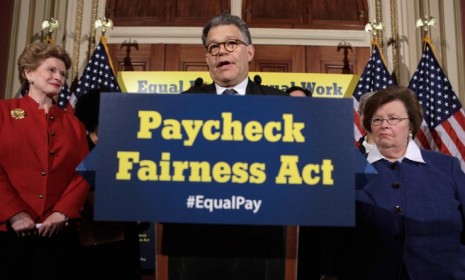Congress' enormous gender pay-gap: By the numbers
Women staffers on Capitol Hill make far less than their male counterparts, bringing the issue of gender inequality to Congress' doorstep

A free daily email with the biggest news stories of the day – and the best features from TheWeek.com
You are now subscribed
Your newsletter sign-up was successful
The enduring pay gap between men and women has long been one of the most stubborn symbols of gender inequality, and in few places is that more obvious than in Congress, says Matt Berman at The National Journal. Women staffers on Capitol Hill make significantly less than their male colleagues, a disparity that is partly explained by the fact that high-level congressional jobs are often occupied by males — leaving the paper-pushing and appointment-making to the ladies. And the gap is most glaring in Republican ranks. Here, a numerical guide to Congress' gender pay gap:
$5,862.56
Average difference between male and female salaries in the House
The Week
Escape your echo chamber. Get the facts behind the news, plus analysis from multiple perspectives.

Sign up for The Week's Free Newsletters
From our morning news briefing to a weekly Good News Newsletter, get the best of The Week delivered directly to your inbox.
From our morning news briefing to a weekly Good News Newsletter, get the best of The Week delivered directly to your inbox.
$10,093.09
The gender pay gap among Republican House staffers
$1,473.65
The gap among Democratic House staffers
A free daily email with the biggest news stories of the day – and the best features from TheWeek.com
$7,277.69
Average difference between male and female salaries in the Senate
$9,805.85
The disparity among Republican Senate staffers
$4,919.46
The disparity among Democratic Senate staffers
41
Percent of House members who employ a female chief of staff
84
Percent of entry-level jobs in the House occupied by women
$0.77
Average amount women make to a man's dollar, nationally
$0.84
Average amount women make to a man's dollar, among House Republican staffers
46
Number of Republican senators (out of 47) who successfully filibustered the Paycheck Fairness Act, which would have given working women more power to sue for equal pay
Sources: The Frisky, National Journal, Slate, ThinkProgress
-
 Minnesota's legal system buckles under Trump's ICE surge
Minnesota's legal system buckles under Trump's ICE surgeIN THE SPOTLIGHT Mass arrests and chaotic administration have pushed Twin Cities courts to the brink as lawyers and judges alike struggle to keep pace with ICE’s activity
-
 Big-time money squabbles: the conflict over California’s proposed billionaire tax
Big-time money squabbles: the conflict over California’s proposed billionaire taxTalking Points Californians worth more than $1.1 billion would pay a one-time 5% tax
-
 ‘The West needs people’
‘The West needs people’Instant Opinion Opinion, comment and editorials of the day
-
 The billionaires’ wealth tax: a catastrophe for California?
The billionaires’ wealth tax: a catastrophe for California?Talking Point Peter Thiel and Larry Page preparing to change state residency
-
 Bari Weiss’ ‘60 Minutes’ scandal is about more than one report
Bari Weiss’ ‘60 Minutes’ scandal is about more than one reportIN THE SPOTLIGHT By blocking an approved segment on a controversial prison holding US deportees in El Salvador, the editor-in-chief of CBS News has become the main story
-
 Has Zohran Mamdani shown the Democrats how to win again?
Has Zohran Mamdani shown the Democrats how to win again?Today’s Big Question New York City mayoral election touted as victory for left-wing populists but moderate centrist wins elsewhere present more complex path for Democratic Party
-
 Millions turn out for anti-Trump ‘No Kings’ rallies
Millions turn out for anti-Trump ‘No Kings’ ralliesSpeed Read An estimated 7 million people participated, 2 million more than at the first ‘No Kings’ protest in June
-
 Ghislaine Maxwell: angling for a Trump pardon
Ghislaine Maxwell: angling for a Trump pardonTalking Point Convicted sex trafficker's testimony could shed new light on president's links to Jeffrey Epstein
-
 The last words and final moments of 40 presidents
The last words and final moments of 40 presidentsThe Explainer Some are eloquent quotes worthy of the holders of the highest office in the nation, and others... aren't
-
 The JFK files: the truth at last?
The JFK files: the truth at last?In The Spotlight More than 64,000 previously classified documents relating the 1963 assassination of John F. Kennedy have been released by the Trump administration
-
 'Seriously, not literally': how should the world take Donald Trump?
'Seriously, not literally': how should the world take Donald Trump?Today's big question White House rhetoric and reality look likely to become increasingly blurred